

It took 60 years, but marchers completed the two-minute, .4-mile walk from First African Baptist Church to the Tuscaloosa County Courthouse on Sunday, as a commemoration of the horrific ordeal known as “Bloody Tuesday.”
On June 9, 1964, 500-plus men, women and children prepared to march from First African to demonstrate at the then-new courthouse, which despite promises had opened with segregated facilities. But the marchers didn’t make it 50 feet before a vicious assault, from a mob wielding hoses, billy clubs and baseball bats, beat them back.
Even at the sanctuary of the church they couldn’t take refuge, as tear-gas canisters crashed through stained-glass windows, and recently-deputized thugs invaded, striking and arresting those attempting to hide.
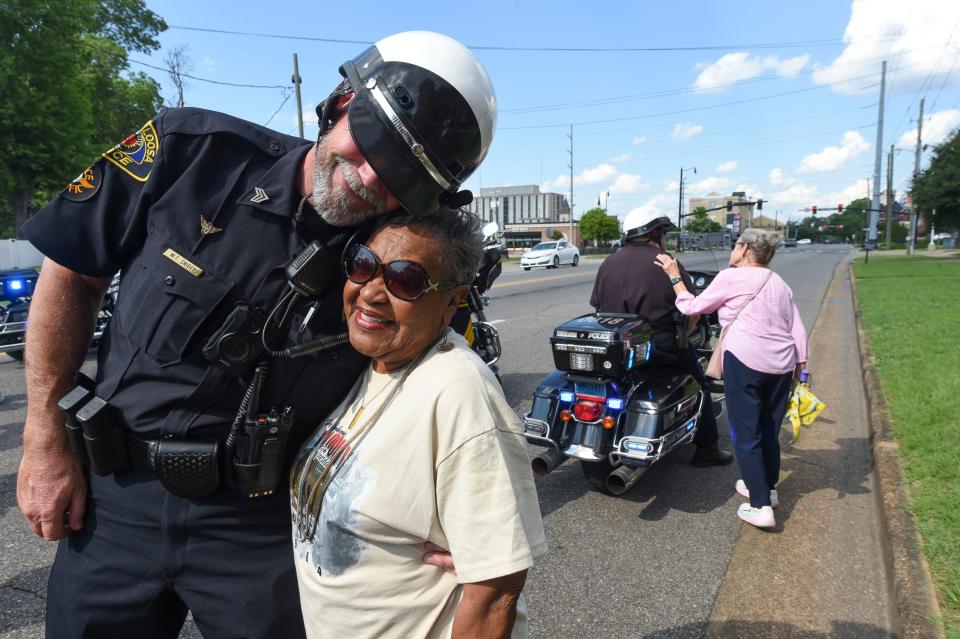
Tuscaloosa Chief of Police William Marable made 94 arrests, including the Rev. T.Y. Rogers Jr. and other leaders, and 33 people were beaten badly enough to require hospitalization. Untold others suffered, but in fear of law enforcement monitoring hospitals, chose to treat injuries themselves.
Sixty years later, roughly 500 present walked ― or rode, given the 95-degree heat and high humidity ― from the church to the courthouse after the church hosted a packed Sunday afternoon service.
More: University of Alabama historian’s book details Tuscaloosa’s ‘Bloody Tuesday’
The church service, filled with fervent gospel music and a rousing exhortation by the Rev. Ransey O’Daniel, also featured:
Recognition of that day’s foot soldiers presented by Irene Byrd, who was among them;
A video showing U.S. Rep. Terri Sewell speaking on the House floor in the nation’s capital on June 7 to commemorate Bloody Tuesday;
Tuscaloosa Mayor Walt Maddox talking about the need for continued vigilance in order to maintain a more perfect union.
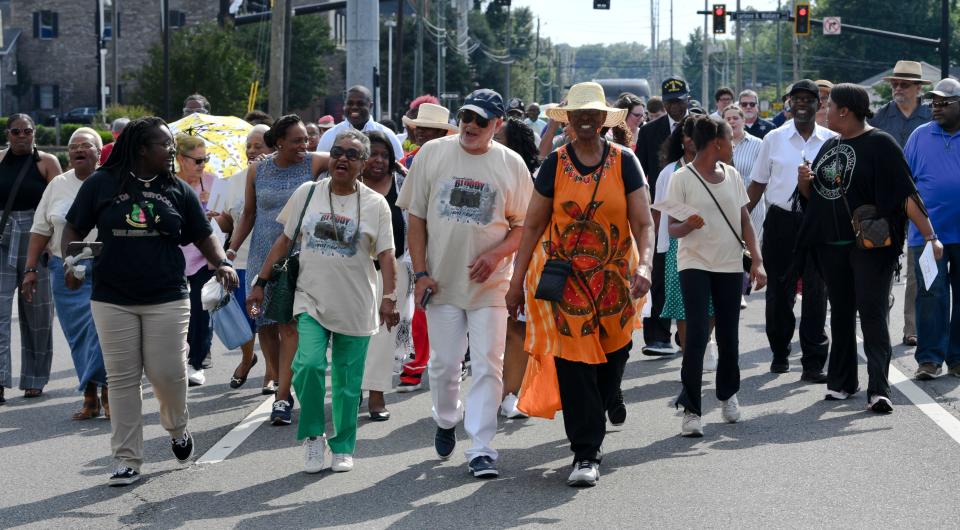
The reception that Sunday’s march received marked a 180-degree correction from 60 years ago. Tuscaloosa County Sheriff Ron Abernathy spoke from atop front steps of the courthouse to those assembled along Greensboro Avenue, as did the Rev. Walter Hawkins of Dry Creek Missionary Baptist Church.
Abernathy said it’s difficult to imagine the pain inflicted by those sworn to uphold law in the Jim Crow South.
“Regrettably, law enforcement was often the public face and administrator of those unjust laws,” Abernathy said. “Sixty years later, I am certainly encouraged by the progress we have made.
More: What to know about Tuscaloosa’s ‘Bloody Tuesday’
“However, there are societal and personal things that cannot be healed by simply forgetting the past. By acknowledging the wrongs we can lead to a more just and unified future.”
Abernathy quoted from the Christian Bible’s Psalm 133: “How good and pleasant it is when brothers and sisters live together in unity?”
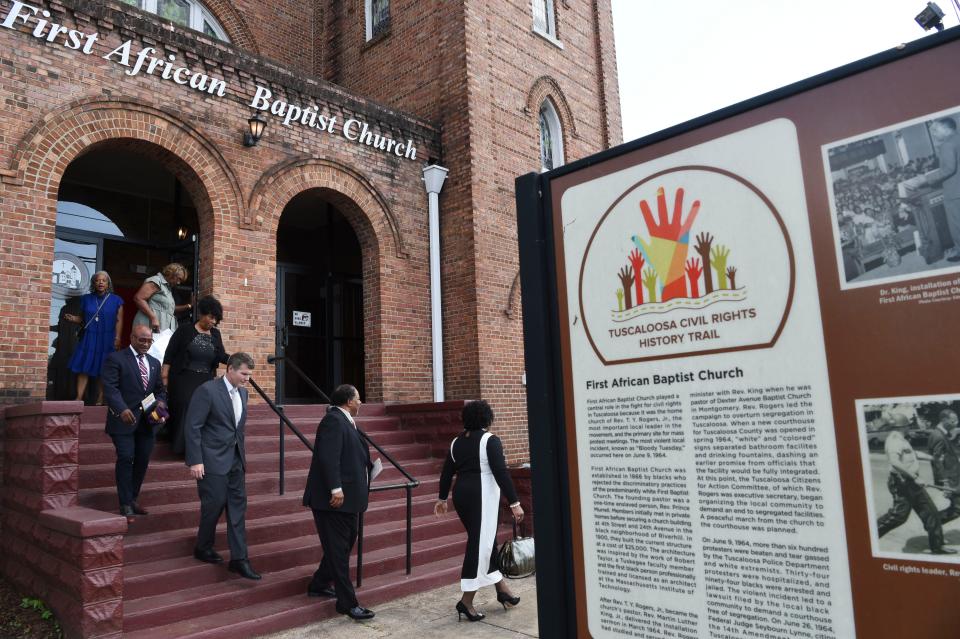
“Today we honor those who have fought for and suffered in the name of justice,” he said. “And we vow to learn from the mistakes of the past, so that the history marked by injustice will never repeat itself, in the laws of the state, or in the hearts of men.”
He also noted the presence of some of his deputies, who unlike those wearing badges 60 years ago, supported this event, financially and physically, “… walking beside these heroes of faith, who by their sacrifices, and often their blood, changed the culture of our community, and our great nation.”
More: Civil rights activist Maxie Thomas honored with Tuscaloosa street renaming
Harper grew up in First African Baptist, hearing stories about Bloody Tuesday from Irene Byrd and the late John Byrd, he said, regarding “… the brutality of our morality, the fragility of our integrity, the fight for civil rights.”
“We had to overcome certain adversities. We were ousted from our ancestral language, heritage and tradition, and yet have successfully acclimated into a society that once said we are three-fifths of a person,” Hawkins said, because “… success is in our DNA.”
Facing oppression, civil rights leaders and foot soldiers rallied in churches, “… and we spoke up, we stood up and we looked up. We marched for those rights that seem to be dwindling among our people today.”
“Our parents, grandparents, aunts, uncles, and friends, they marched and fought, knowing that the violence might indeed occur.”
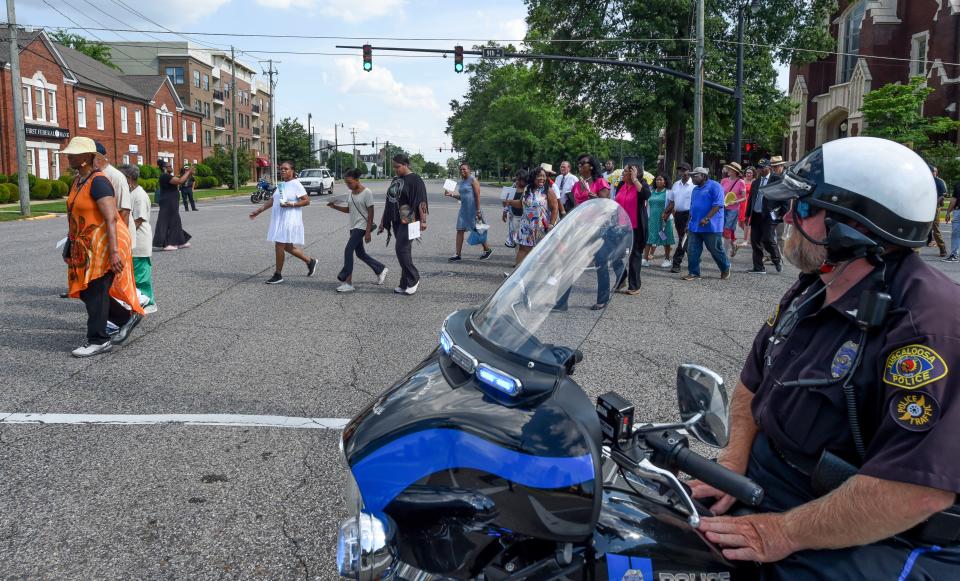
Marches and rallies continue, he said, because some seem intent on forgetting the sins of the past.
“We are right in history, right now. We are saying never again. We will never forget. We will teach our youth our history. We will never return to the days when we did not matter, when our voices were not heard, when our opinions were not valued,” Hawkins said.
“We will not return to another Bloody Tuesday. … We walk now because of the past that was etched by the people who would not lay down nor continue to be disrespected; who would not lay down and continue to be under-protected; who would not lay down to continue to be neglected.”
Hawkins spoke about the intersection of highways 82 and 43 in Northport, one notorious for clogged traffic. The city put up a sign, he said, that read: “Keep On Moving.”
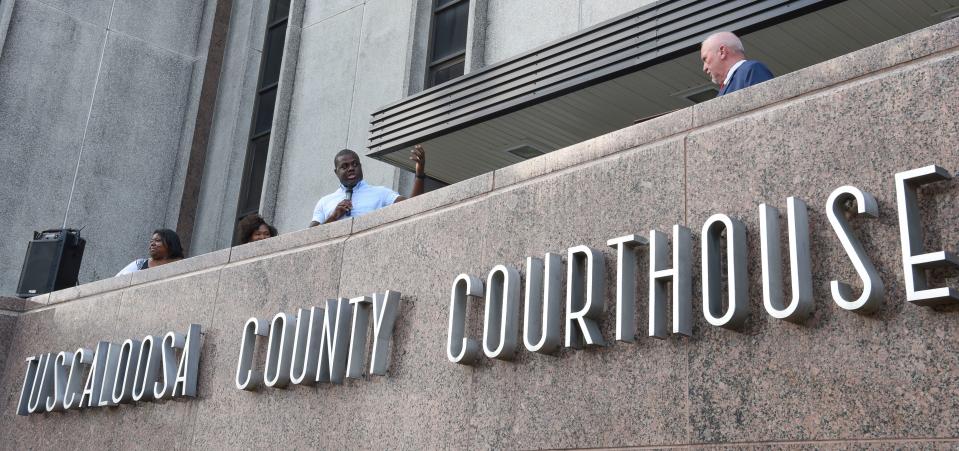
“And now there is no backup,” Hawkins said. “Sixty years ago, there was a backup. There was a congestion. There was a problem in our society that day.” The late Rev. T.Y. Rogers Jr., sent by the Rev. Martin Luther King to organize civil rights matters in Tuscaloosa, held up a similar sign, he said.
“We are here today to tell everybody we’re going to keep on moving. We’re going to keep on moving toward equality. We’re gonna keep on moving toward education. We’re going to keep on moving towards non-violence,” Hawkins said. “Church, we’re gonna keep on moving.”
Afterward, a reception was held at First African Baptist, with University of Alabama historian John Giggie signing copies of his recently published book, “Bloody Tuesday: The Untold Story of the Struggle for Civil Rights in Tuscaloosa.”
Reach Mark Hughes Cobb at mark.cobb@tuscaloosanews.com.
This article originally appeared on The Tuscaloosa News: Tuscaloosa marchers complete the walk, 60 years after Bloody Tuesday
EMEA Tribune is not involved in this news article, it is taken from our partners and or from the News Agencies. Copyright and Credit go to the News Agencies, email news@emeatribune.com Follow our WhatsApp verified Channel









